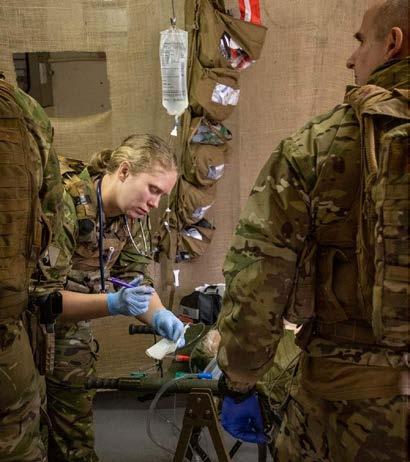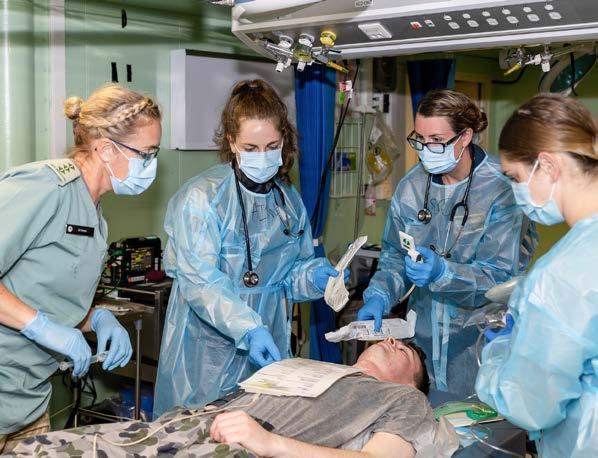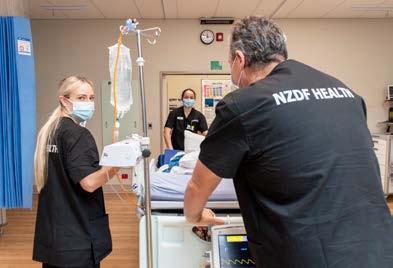
4 minute read
108 YEARS OF NURSING
Throughout this time the role of the military nurse has adapted and grown. Currently there are 19 nursing officers within the Royal New Zealand Nursing Corps, the majority of whom work within the Deployable Health Organisation (DHO).
The Army’s Royal New Zealand Nursing Corps recently celebrated its 108th year of being a Corps.
Advertisement
Nurses are known to have been active in the New Zealand Defence Force since as early as the Boer War, 1899, when 27 nurses actively served, with many more serving throughout the years both in New Zealand and overseas until the present day.
Organisational fit
The role of the nurse in Defence is one that is often overlooked, as the competency and ability of a NO cannot be easily compared to that of a soldier. Nurses are often working tirelessly to put the wellbeing of patient and others they are working with first.
The work of a nurse is largely unseen.
It is not flashy but provides solid consistency. Nurses are an integral resource in providing healthcare. Just one look at the number of nurses required to keep a hospital or health facility running highlights the importance of the role. Nurses are actively involved in all realms
Nurses within the DHO are expected to work in a variety of environments and have a vast skill-set, ranging from providing primary healthcare in military camps to treating trauma in austere environments. Nurses must be adaptable, flexible and continually maintain current clinical practice in order to fulfil a wide range of military outputs and provide professional up-to-date healthcare for military personnel.
The role of the DHO Nursing Officer is to provide healthcare and support to the Role 1 and Role 2 medical space. They work closely with the medical team which consists of medical officers, medics, allied health and assistant staff. Nurses often lead the extended care for the patient when there may be a delay in transfer or medical evacuation.
DHO nurses have a number of medical outputs that they maintain in order to remain deployable. One of these is clinical time spent working in public hospitals around the country. This is completed when they are not busy providing medical care for patients in the field, on exercises, delivering clinical care in various health centres and bases around New Zealand, or retaining all expected military skills.
DHO nurses spend a number of weeks working in their chosen specialty to remain clinically up-todate and enhance their nursing skills, while also representing the NZDF. You may find our nurses working in a variety of areas from the Emergency Department through to the Intensive Care Units in different hospital settings throughout New Zealand. Despite a high tempo work load and current limitation in numbers, nursing officers continue to contribute towards significant health outputs within New Zealand and abroad.
DHO Nursing Experiences
The Army’s nursing officers become involved in many aspects of Defence. In recent years nursing officers and especially those working in DHO have been involved with many different types of health responses both at home and overseas. The nurses continue to prove they are flexible and can adapt to any working environment across land, sea and air domains.
One of their most recent tasks was the vital support and dedication they provided during the Covid-19 pandemic. They took on various roles such as helping lead the NZDF national response, being national and regional clinical leads, working throughout the various vaccination campaigns nationally and taking the lead for the vaccination roll out for Pacifica and Māori PHO members in the Hastings and Napier region.
Papua New Guinea. They have had integral roles in operations in countries such as Sinai, Iraq and Afghanistan. Whilst history dictates that all nursing officers are Army within the NZDF, at times you will see them immersed in the day-to-day life at sea on some of the New Zealand’s Navy ships or providing medical assistance on aircraft in and around New Zealand.
One of NZDF specialized aero-medical nurses was put through their paces in 2021 in the aero-medical space when providing support during Afghanistan repatriation efforts, then supporting a risky winter patient evacuation from Antarctica.

of healthcare, and the basis of their training revolves around delivering best practice patient care, infection control principles and maintaining clinical plans set by doctors. Within the Defence environment nurses liaise with their multi-disciplinary or external provider’s team to provide the best care for their patients. There is always a competing priority to follow military ideology yet put their patients first, as this is the foundation of nursing. The nurse is the patient’s best advocate for health and wellbeing, and is seen as the grounding force in whatever they do.
Nursing officers are proud to be a part of the New Zealand Defence Force and contribute to impactful missions both here in New Zealand and overseas.
Although the Corps is small it makes a big impact on health outputs across the all three Services both in New Zealand and overseas. The Corps, like many in Defence, has its current challenges with attrition and retention in a globally competitive health market. The Nursing Corps, along with all the nurses that work in the Defence Force, are committed to improving professional practice. As NZDF’s Principal Nursing Officer, MAJ David Greenhough says: ‘He iti mokoroa nāna te kahikatea I kakati’. Even the small can make an impact on the big.
As nurses, uniformed and civilian we all strive to deliver best quality patient care; Kia aroharoha Kia maia –compassion with courage.
When not busy responding and supporting something like the pandemic, DHO nurses are involved in overseas exercises or operations to provide additional health assets. DHO NOs were recently tasked with to cover exercises in places like Fiji, Australia, Hawaii, and
On New Zealand soil, you will often find NOs providing medical support during field exercises, working in the regional health centres, or delivering health care during HADR responses. While nurses are actively involved in all aspects of Defence they make the time to be involved in non-nursing elements and you will come across some of them competing in the Invictus Games, representing Defence in sport and even at times in roles such as aide-de-camp to the Governor General.






